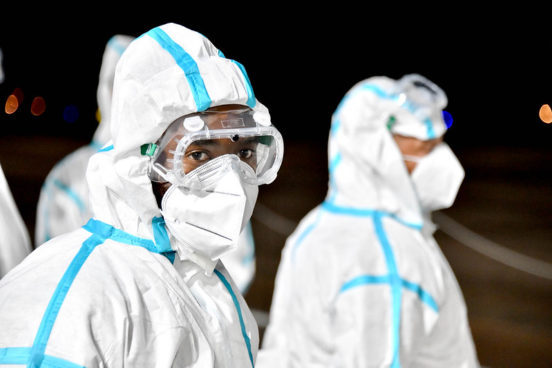Throughout the COVID-19 crisis there has been concern about the particular vulnerabilities of the African continent in the face of a pandemic. The Africa Joint Continental Strategy lays out these challenges in stark terms arguing that Africa’s ‘baseline vulnerability’ is high due to inadequate health and hygiene systems, increasing travel, and other ongoing health and social crises.
Despite these underlying challenges and the continually evolving nature of the pandemic, the World Health Organisation (WHO) commended the continent on 25 May for being the ‘least-affected region globally’. There has not been uniformity in how African states have responded to the COVID-19 crisis.[1] As with any region, there are examples of effective and innovative responses along with failures in leadership. However, there has been a significant mobilisation to coordinate a response at the continental level along with more limited responses from sub-regional organisations. This blog provides a very brief overview of the responses of African intergovernmental organisations (IGOs) to the COVID-19 crisis,[2] leading into a discussion on the impact of these responses and the division of labour amongst states, sub-regional, regional and international organisations in addressing cross-border challenges. When responding to challenges from public health threats to violent conflict, coordination across governance levels is complex, and the innovative strategies and mechanisms used to manage the COVID-19 pandemic may alter responses to future crisis.
African Continental Response
The response at the continental level is led by the African Union (AU) and African Centres for Disease Control and Prevention (Africa CDC). Africa CDC was established in January 2016 by the AU Assembly of Heads of State and Government and launched one year later. There are Africa CDC Regional Collaborating Centres (RCCs) across five sub-regions, but how active the RCCs are and the extent to which Africa CDC collaborates with previously established sub-regional health bodies varies significantly. The Africa Joint Continental Strategy was produced by the AU and Africa CDC and sets out the primary objectives of ensuring a coordinated response and promoting evidence-based practices to prevent, treat, and control COVID-19.
The Joint Continental Strategy calls for two bodies to implement it – the Africa Task Force for Coronavirus (AFTCOR) and Africa CDC’s Incident Management System (IMS). AFTCOR’s role is to support member states by working through and building upon existing structures, notably the five RCCs. AFTCOR is comprised of a steering committee chaired by the Director of Africa CDC and a number of working groups, and it focuses on six issues – surveillance, infection prevention and control, clinical support, laboratory diagnosis, communications, and medical supply procurement. Africa CDC’s IMS and its Emergency Operations Centre for COVID-19 were activated on 27 January 2020. The first confirmed case of COVID-19 in Africa was reported by Egypt on 14 February 2020. Since then Africa CDC has been tracking cases across Africa through the Africa CDC Dashboard and in weekly briefings that present information by member state and sub-region.
The response has been guided by the six focus areas identified in the Joint Continental Strategy. For example, on surveillance Africa CDC in collaboration with the WHO ran Training of Trainers events across member states to enhance surveillance for COVID-19 at points of entry. To support laboratory diagnosis, as of 17 March 2020, over 40 member states had been trained on laboratory confirmation of SARS-CoV-2, and all laboratories received start-up kits after training. Member states with confirmed cases at the time received additional kits. More recently, Africa CDC partnered with the MasterCard Foundation to deliver one million test kits and deploy 10,000 health workers across Africa to respond to the COVID-19 crisis. On communications, Africa CDC has produced materials for the general public and healthcare workers. There have also been innovative initiatives to combat disinformation and convey risk information. Africa CDC has held numerous virtual training events for policymakers, clinicians, journalists, and other interested parties. Africa CDC is working with partners to launch communication projects in African languages to counter misinformation, and Africa CDC is in direct contact with journalists through a WhatsApp media group.
The AU has spearheaded additional initiatives to support the continental response and address the wider ramifications of the COVID-19 crisis. For example, the AU COVID-19 Response Fund was launched on 26 March 2020. The fund supports the procurement of critical medical supplies that are then distributed by Africa CDC, and it will also be used to mitigate the socio-economic and humanitarian crises brought on by the pandemic. The AU has used it continental convening power and relationships with other IGOs to advocate on other issues that the COVID-19 pandemic has exacerbated. The communique of the recent 928th meeting of the AU Political Security Council (PSC) highlighted protectionist policies that restrict the access of developing countries to crucial medical supplies and called on the WHO to help ensure access to need supplies. The AU has also pushed for debt relief to help African states devote the necessary resources to the fight against COVID-19 and its societal-wide impacts. In addition, the AU has marshalled parts of its peace and security architecture to respond to the pandemic. The Africa CDC and Operations Divisions of the AU Peace and Security Department deployed 28 responders to several member states through the AU Strategic Lift Capacity. This was done in line with Article 6 of the AU Peace and Security Protocol that lists one of the functions of the PSC as ‘humanitarian action and disaster management’.
Sub-Regional Initiatives
The continental response led by the AU and Africa CDC is one piece of a very complex puzzle with other actors across governance levels from local to international marshalling responses to a crisis that transcends governance boundaries and physical borders. Beyond the Africa CDC RCCs, sub-regional organisations have also been active in responding to the COVID-19 pandemic. Sub-regional organisations encompass the AU-recognised regional economic communities (RECs) but can also include bodies that are not recognised by the AU. One of the most established bodies, the Economic Community of West African States (ECOWAS), is tracking cases in the West African region. The sub-regional health body is the West African Health Organisation (WAHO), which was created in July 1987.
In response to the COVID-19 crisis, ECOWAS and WAHO activated the West African communication platforms, distributed supplies to member states, finalised a Regional Strategic Plan, and raised funds for the response effort. Beyond sub-region specific initiatives, West African institutions are also collaborating with Africa CDC, particularly on support for laboratories and medical supply chains. During a 23 April videoconference, the ECOWAS Authority of Heads of State and Government recommended strengthening collaboration between WAHO and Africa CDC. The Authority also recognised the profound economic impact of COVID-19 and recommended a number of initiatives, including issuing treasury bonds and bills, deploying financial tools through Central Banks, mobilising resources from the international community, and supporting AU work to negotiate debt cancellation and raise funds.
Other sub-regional bodies have responded to the COVID-19. For example, the Southern African Development Community (SADC) is also tracking COVID-19 cases in its region. SADC has issued bulletins throughout the crisis with information on the pandemic, its economic impact, and recommendations for member states. It also adopted guidelines on 6 April to facilitate cross-border transportation of essential goods while limiting non-essential mass movements. Also in early April, the UN negotiated a humanitarian corridorin southern Africa to facilitate the distribution of food aid to countries in the region facing food shortages. This underscores the complexity of cross-border movement and the multiple organisations involved in facilitating access for essential supplies and goods. On 29 May, SADC’s Council of Ministers called for increasing coordination with other regional and sub-regional bodies, specifically the AU, the Common Market for Eastern and Southern Africa (COMESA), and the East African Community (EAC), to harmonise measures and regulations. Some other sub-regional organisations have struggled to respond to both COVID-19 and other ongoing challenges, such as violent conflict. The Economic Community of Central African States (ECCAS) held a high-level meeting in early June and adopted a regional strategy to respond to the COVID-19 crisis and its impacts. However, ECCAS in the midst of institutional reforms, and Central Africa is grappling with multiple, persistent conflicts. The UN Regional Office for Central Africa (UNOCA) is continuing operations, and there is a newly created UNOCA-ECCAS working group to support the ECCAS response. These varied responses show coordinated efforts to address both the health and economic dimensions of the pandemic and institutional cooperation with continental and international organisations. However, the resources available for responses and levels of coordination are uneven.
Responding to Cross-Border Challenges
This brief overview of African IGO responses to the COVID-19 crisis, provides a baseline of understanding but leaves many unanswered questions. First, how impactful are the continental and sub-regional initiatives? To what extent do continental and sub-regional strategic plans, support, and recommendations matter in member state responses? The impact of these organisations is an open question with ongoing academic and policy debates about the extent to which IGOs can act as norm and policy entrepreneurs and help to shape regional ideas, policies, and practices that then influence policies and practices at the national level in member states.[3] The impact of IGO responses to the COVID-19 pandemic is an open question as events are still unfolding, but there are research projects underway that aim to address these larger questions. For example, the University of Edinburgh COVID-19 response governance mapping initiative aims to understand how COVID-19 response decisions were made in several African states and what factors influenced them, which may provide additional insights into the impact of IGOs on state-level decision making.
The second pressing question is how are issues that transcend borders dealt with by the plethora of IGOs? Africa is a particularly dense space when it comes to IGOs due to an active continental organisation with strong international partnerships and several active sub-regional organisations. The division of labour amongst continental and sub-regional organisations in peace in security is an ongoing discussion in Africa within the AU, between the AU and RECs, and amongst the various RECs.[4] Furthermore, the practices around the division of labour in peace and security vary in different sub-regions and in different arenas, from peace support missions to engagement in peace processes.[5] As this piece has shown, there are also numerous IGOs at multiple governance levels responding to this health crisis. While COVID-19 is clearly a public health crisis, it is also a human security issue because of the loss of life and livelihoods and its potential to exacerbate ongoing inequalities and conflicts. The African continental public health and security mechanisms have worked together throughout this crisis. For instance, the AU has used African Peace and Security Architecture (APSA) mechanisms to respond to the pandemic. As such, it is likely that the response to the current pandemic will have far-reaching impacts not only on how African IGOs manage health crisis but other challenges that transcend borders. Moving forward this project will examine how the responses of African IGOs may impact future policy and practice. Will this lead to an expansion of how APSA is used? Will the strong response by continental organisations lead to an expansion of their role not only in Africa but globally as other international institutions are side-lined due to rivalries between powerful states? All of these questions will be critical to understanding the state of global governance as we continue to navigate this crisis and eventually move beyond it.
This is a repost from the Political Settlements Research Programme.
Dr Kathryn Nash is a postdoctoral research fellow with the Political Settlements Research Program (PRSP).
About this Project
This piece is part of a larger project funded by the University of Edinburgh College of Arts, Humanities, and Social Science to map and analyse the responses of regional and sub-regional organisations to Covid-19 in Asia, Africa, and Latin America. A series of blog posts detailing organisational responses is the first output, and the project will feed into other collaborative projects. It will also produce in-depth pieces to answer the more complex questions around the impact of regional and sub-regional efforts to combat this pandemic and the possibly long-term effects of the Covid-19 crisis on organisational priorities and practices.
[1] For information on the responses of African states, see the following resources: (1) ACAPS, “COVID-19 Government Measures”. Accessed 22 June 2020. Available at https://www.acaps.org/projects/covid19/data; (2) University of Edinburgh, “COVID-19 response governance mapping initiative”. Accessed 24 June 2020. Available at: http://www.covid19-governance.sps.ed.ac.uk/
[2] There are several excellent resources that provide in-depth analysis and documentation of African IGO responses, including: (1) Alfonso Medinilla, Bruce Byiers, and Philomena Apiko, “Discussion Paper No. 272 African regional responses to COVID-19”. 18 May 2020. Available at: https://ecdpm.org/publications/african-regional-responses-covid-19/ (2) The Global Health Network COVID-19 Outbreak Research Knowledge Hub, “African COVID-19 Response”. Accessed 7 June 2020. Available at: https://coronavirus.tghn.org/regional-response/africa-ncov/; (3) Tralac, “Regional responses to COVID-19 in Africa”. Accessed 7 June 2020. Available at: https://www.tralac.org/news/article/14570-regional-responses-to-covid-19-in-africa.html
[3] For examples of articles that analyse IGO roles and impact, see: Adriana Nilsson, “Making norms to tackle global challenges: The role of Intergovernmental Organisations,” in Research Policy 46 (2017); Micha Wiebusch and Christina Murray, “Presidential Term Limits and the African Union,” in Journal of African Law 63, S1 (May 2019).
[4] ‘Decisions of First Mid-Year Coordination Meeting Between the African Union, the Regional Economic Communities and the Regional Mechanisms,” African Union, 8 July 2019. Available at: https://au.int/en/decisions/decisions-first-mid-year-coordination-meeting-between-au-recs-and-regional-mechanisms; “Final Communique of the Joint Summit of ECOWAS and ECCAS Heads of State and Government on Peace, Security, Stability and the Fight Against Terrorism and Violent Extremism,” 30 July 2018. Source: ECOWAS Commission; “Peace and Security Council Report No 113,” 29 May 2019. Available at: https://issafrica.org/research/peace-and-security-council-report/peace-and-security-council-report-no-113.
[5] Brooke Coe and Kathryn Nash, “Peace process protagonism: the role of regional organisations in African in conflict management” in Global Change Peace and Security (June 2020). Available at: https://www.tandfonline.com/doi/full/10.1080/14781158.2020.1777094










Comments by